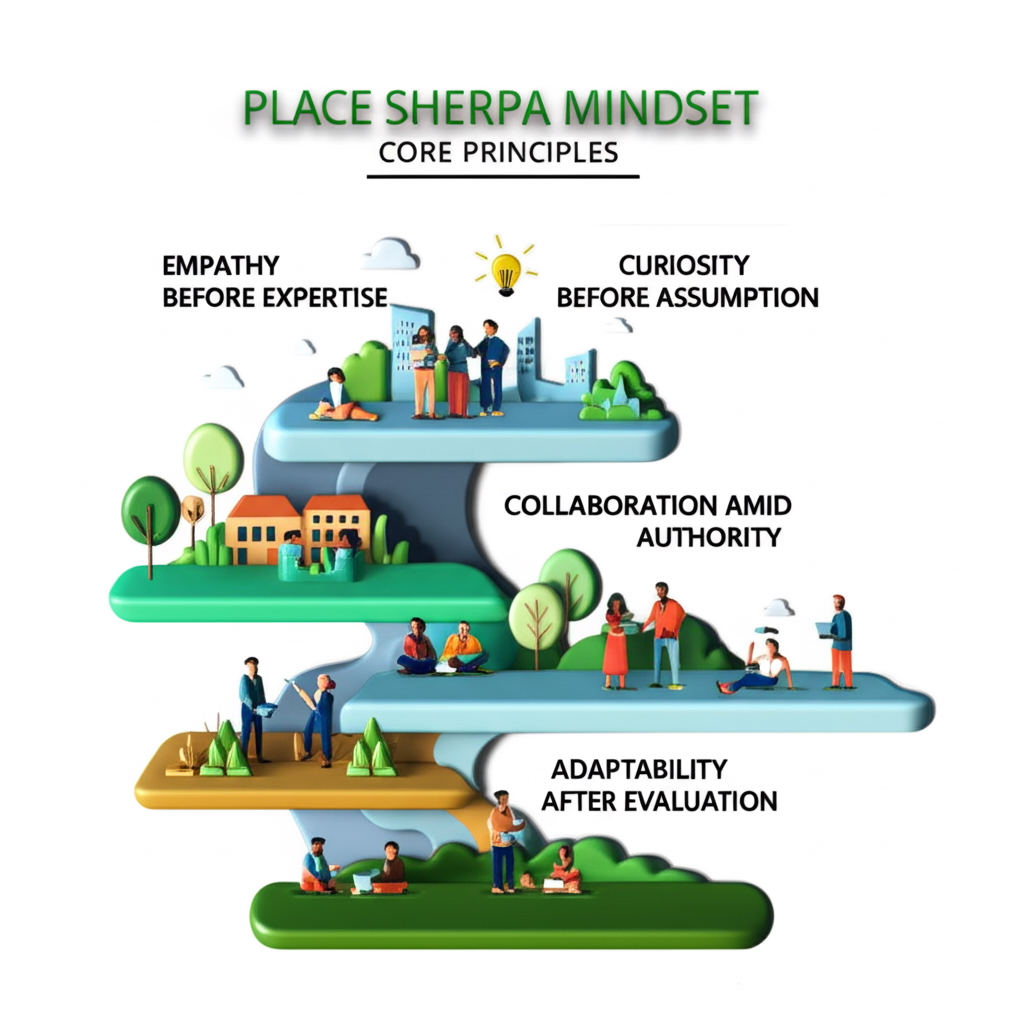Building upon the framework of a local housing panel, Chuck Wolfe suggests that advocacy and policy discussions would be enhanced by a “sherpa mindset” that focuses on lived experiences, facilitates applied knowledge of urban places, and promotes stakeholder discussion.


Today, notes Wolfe, city-related dialogues are more focused on day-to-day realities than grand visions of the City Beautiful.
Beyond architecture and urban design critiques, cities and towns face the affordability crisis, the complex push for zoning revisions, and ever-evolving dialogues around public safety. Even the reimagining of downtowns in a post-COVID era now directly confronts these pressing concerns.
For example, last week in Santa Fe, Chainbreaker—a local social justice group—convened a panel on housing and the unhoused. Community members gathered to share their experiences and concerns about housing and homelessness in Santa Fe. A panel discussion (among a journalist, activist, a former unhoused person, and a leading housing organization representative) ranged from the urgent need for increased housing supply to concerns about rising rents and displacement, the prospect of stricter controls on short-term rentals, and the role of pending revisions to the comprehensive plan and land use code.
Noting a rich discussion that lacked the presence of all key stakeholders, Wolfe underscores the challenge around many divisive urban issues: how to bridge divides in a way that might foster true collaboration?
He provides a new name for a fine-tuned approach that centers on proper issue identification, contextual knowledge of a place, and an assurance that the appropriate stakeholders can move forward: the way of the“Place Sherpa,” a specialized urbanist and guide who empowers individuals, organizations, and communities to gain a deep understanding, observe, and collaboratively shape their built environments.
Unlike traditional experts who might primarily diagnose problems and prescribe top-down solutions, a Place Sherpa walks alongside stakeholders, suggests Wolfe:
They provide a toolkit to demystify urban complexities, foster acute observation, and facilitate locally-informed, more innate placemaking. They bridge the gap between expert knowledge and lived experience, ensuring that urban evolution is empathetic, sustainable, and truly beloved by its inhabitants.
If such a Sherpa doesn’t immediately demand a podium or command a climb, and their nature is to walk alongside, patiently ask questions, and share knowledge gleaned from other journeys and examples, one key question is whether planners could add the way of the Sherpa to their professional roles.
FULL STORY: The Rise of the Place Sherpa: A Personal Reflection on Co-Creation

Planetizen Federal Action Tracker
A weekly monitor of how Trump’s orders and actions are impacting planners and planning in America.

Silicon Valley ‘Bike Superhighway’ Awarded $14M State Grant
A Caltrans grant brings the 10-mile Central Bikeway project connecting Santa Clara and East San Jose closer to fruition.

Amtrak Cutting Jobs, Funding to High-Speed Rail
The agency plans to cut 10 percent of its workforce and has confirmed it will not fund new high-speed rail projects.

Planting for Change: How Trees Are Powering Climate Action
"Combating Climate Change with Trees" highlights how Southern California communities are strategically planting and nurturing urban forests to cool neighborhoods, improve air quality, and advance environmental justice.

Could Planners Adopt a 'Place Sherpa' Role?
Building upon the framework of a local housing panel, Chuck Wolfe suggests that advocacy and policy discussions would be enhanced by a “sherpa mindset” that focuses on lived experiences, facilitates applied knowledge of urban places, and promotes stakeholder discussion.

California Advances Its 30x30 Conservation Goals
California is making significant progress toward its 30x30 conservation goals, but looming federal rollbacks and gaps in biodiversity protections could threaten the state’s efforts to protect lands and coastal waters by 2030.
Urban Design for Planners 1: Software Tools
This six-course series explores essential urban design concepts using open source software and equips planners with the tools they need to participate fully in the urban design process.
Planning for Universal Design
Learn the tools for implementing Universal Design in planning regulations.
Caltrans
City of Fort Worth
Mpact (founded as Rail~Volution)
City of Camden Redevelopment Agency
City of Astoria
City of Portland
City of Laramie




























